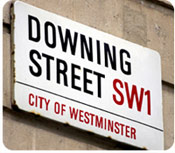Six years since Blair seminar began NPfIT
- 20 February 2008
 Six years ago this week Tony Blair chaired a No 10 Seminar on NHS IT, that paved the way to the £12.4bn NHS IT programme. FOI papers show the PM was pushed hard for early delivery.
Six years ago this week Tony Blair chaired a No 10 Seminar on NHS IT, that paved the way to the £12.4bn NHS IT programme. FOI papers show the PM was pushed hard for early delivery.
At the 18 February seminar, the then Prime Minister backed increased IT investment but repeatedly urged accelerated implementation schedules for electronic patient records and booking systems to provide the public with tangible evidence of NHS modernisation.
As well as the PM the seminar included health secretary, Alan Milburn, health minister Lord Hunt, NHS chief executive Nigel Crisp, DH director Sir John Pattison, e-Envoy Andrew Pinder, head of the Office for Government Commerce (OGC) Peter Gershon together with Cisco and the UK MD of Microsoft. The high-powered meeting set the foundations for what became the NHS National Programme for IT.
New papers released under FOI show that Blair fully backed the need for additional investment in NHS IT, and the priority areas recommended by the DH, but pressed hard for commitment to delivery within what quickly proved an unrealistic timetable of two to three years.
The seminar pegged expectations on delivery at a level the DH, NHS and its suppliers have simply been unable to meet since. Despite progress none of the targets set six years ago has since been met.
A summary of the seminar states: “The Prime Minister asked whether the programme could be accelerated… Taking forward the programme faster than currently planned would help underpin the reform agenda and also provide visible evidence of NHS modernisation to patients and the public.”
The document adds, the PM “agreed with the priority areas of work outlined by Sir John Pattison, but asked the Department of Health to look again at its implementation programme and accelerate it where possible. Greater central direction of the programme would help provide momentum and ensure NHS organisations complied with standards.”
Showing willing, Peter Gershon said the OGC, the Treasury body responsible for the subequent Gateway reviews of the NHS IT project, said there was “scope to reduce the time between project conception and the awarding of the contract of the contract if those involved had a clear idea of what they wanted”.
Similar can-do was shown Lord Hunt [who was to resign a year later in protest at the Iraq war]; he said NHS IT had historically been dogged by too little managerial capacity and clinical ownership. “The key was to stronger central direction to accelerate the pace of change and make more use of partnerships with the private sector”.
Back in March 2002 E-Health Insider first reported on the pressure DH research director Sir John Pattison said he and the DH team had been under from the the PM on delivery.
Speaking at Healthcare Computing in March 2002, Sir John said the DH team had been asked at the previous months’s seminar how long it would take to deliver a programme based on infastructure, electronic records, electronic booking, and e-prescribing.
“We swallowed hard and said ‘three years’.” A tighter time scale was demanded and Sir John said that, in the end, they agreed on two years and nine months. As it transpired early timetables for delivery by the end of 2005 proved hopelessly optimistic.
Targets had already stretched by May 2002 when the strategy that received the PM’s go ahead was based on a ‘National Bookings Service’ to be 100% implemented by December 2005, plus a ‘National Health Record Service’ and ‘National Prescriptions Service’ fully operational by December 2007.
Local Electronic Patient Records meanwhile were to be delivered by a list of accredited suppliers, offering systems compliant with rigorous national XML-based data standards. Elements of EPR systems were to be partly implemented by all PCTs and NHS Trusts by December 2005, with full implementation by December 2007.
The full implementation programme of what is now termed the Care Records Service currently stretches out to 2013.
Interestingly the FOI documents indicate that whatever private doubts attendees may have had, nobody at the seminar told the PM such an ambitious centralised programme could not be achieved within three years. Instead his advisors urged him to press for early delivery.
Finally the FOI papers highlight that running the country is a busy job. The time the PM spent chairing the seminar that led to the world’s largest civil IT project is shown as 45 minutes, with the other participants allocated a further 45 minutes after he departed.
Links
DH Preparing £5 Billion IT Strategy
DH Presents Blueprint for IT Transformation




